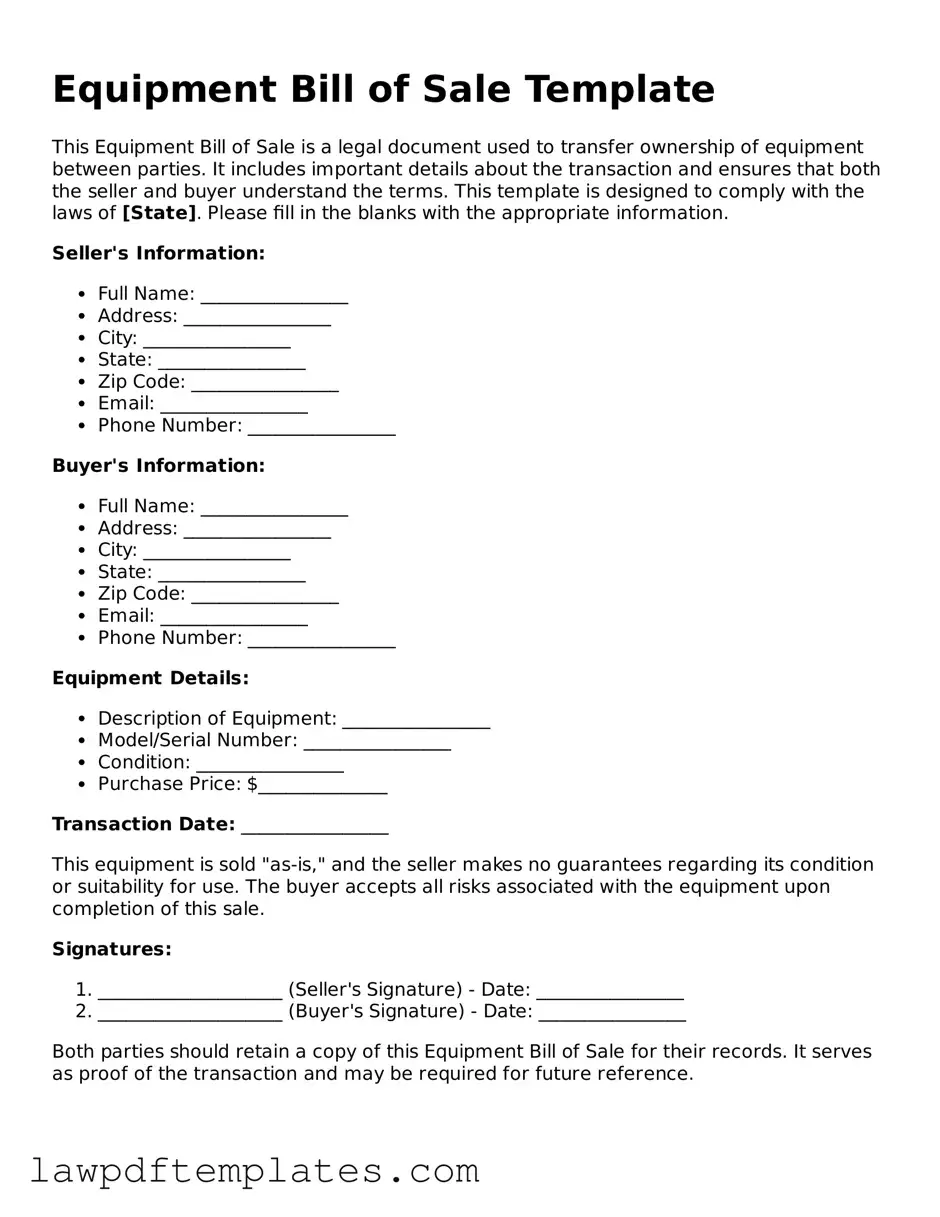Attorney-Approved Equipment Bill of Sale Document
Form Breakdown
| Fact Name | Details |
|---|---|
| Definition | An Equipment Bill of Sale is a legal document that records the sale of equipment from one party to another. |
| Purpose | This form serves to provide proof of ownership transfer and protects both the buyer and seller. |
| Components | Typically includes the seller's and buyer's information, a description of the equipment, sale price, and date of sale. |
| State-Specific Forms | Some states may have specific requirements for the Equipment Bill of Sale, including additional disclosures. |
| Governing Law | In the United States, the sale of goods is governed by the Uniform Commercial Code (UCC), which varies by state. |
| Signatures | Both parties should sign the document to validate the transaction and confirm agreement to the terms. |
| Record Keeping | It is advisable for both the buyer and seller to keep a copy of the Equipment Bill of Sale for their records. |
| Tax Implications | Sales tax may apply depending on the state, and both parties should be aware of their tax obligations related to the sale. |
Sample - Equipment Bill of Sale Form
Equipment Bill of Sale Template
This Equipment Bill of Sale is a legal document used to transfer ownership of equipment between parties. It includes important details about the transaction and ensures that both the seller and buyer understand the terms. This template is designed to comply with the laws of [State]. Please fill in the blanks with the appropriate information.
Seller's Information:
- Full Name: ________________
- Address: ________________
- City: ________________
- State: ________________
- Zip Code: ________________
- Email: ________________
- Phone Number: ________________
Buyer's Information:
- Full Name: ________________
- Address: ________________
- City: ________________
- State: ________________
- Zip Code: ________________
- Email: ________________
- Phone Number: ________________
Equipment Details:
- Description of Equipment: ________________
- Model/Serial Number: ________________
- Condition: ________________
- Purchase Price: $______________
Transaction Date: ________________
This equipment is sold "as-is," and the seller makes no guarantees regarding its condition or suitability for use. The buyer accepts all risks associated with the equipment upon completion of this sale.
Signatures:
- ____________________ (Seller's Signature) - Date: ________________
- ____________________ (Buyer's Signature) - Date: ________________
Both parties should retain a copy of this Equipment Bill of Sale for their records. It serves as proof of the transaction and may be required for future reference.
Common mistakes
Filling out an Equipment Bill of Sale form can seem straightforward, but many people make common mistakes that can lead to complications. One frequent error is not providing complete information about the equipment being sold. Sellers often forget to include essential details such as the make, model, and serial number. Without this information, it becomes difficult for the buyer to verify the equipment’s identity and condition.
Another common mistake is neglecting to include the sale price. This omission can create confusion later on, especially if disputes arise regarding the value of the equipment. Buyers and sellers need to agree on a price, and documenting it clearly in the bill of sale helps protect both parties. A clear sale price also aids in tax reporting and future transactions.
Many individuals also overlook the importance of signatures. A bill of sale is only valid when both the seller and the buyer sign it. Failing to obtain the necessary signatures can render the document ineffective. This step is crucial in establishing that both parties agree to the terms of the sale and acknowledge the transfer of ownership.
Finally, people often forget to keep copies of the completed form. After the sale, both parties should retain a copy for their records. This documentation serves as proof of the transaction and can be useful for future reference. Without a copy, individuals may find themselves in a difficult position if questions about the sale arise later on.
Consider Popular Types of Equipment Bill of Sale Documents
Dog Contract - Enables buyers to know they are getting a healthy pet.
In addition to the details required for a successful transfer, it's beneficial for both buyers and sellers to access reliable resources, such as the Fast PDF Templates, which provide templates that can simplify the preparation of the Florida Motor Vehicle Bill of Sale form and ensure all necessary information is accurately captured.
